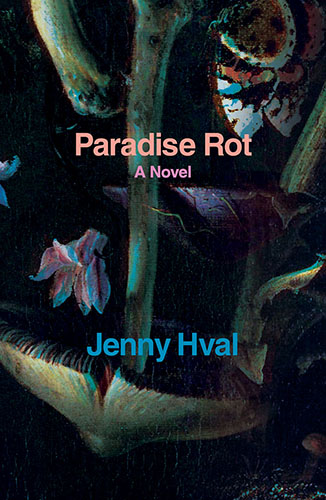

Paradise Rot is a bisexual haunted bildungsroman; it is kafkaesque, if Kafka had been a Norwegian girl in the early 2000s moving to a coastal English town for uni. The narrative starts out atmospheric but mostly grounded, and then gradually ascends into wonderful, heightened weirdness.
The protagonist Jo is struggling to fit into her new environment, she's too foreign, too quiet and serious. She struggles to find somewhere to stay, until she meets Carral who lives in an unusual repurposed warehouse. The walls between rooms in the warehouse are paper thin, there is no privacy, and the outer walls seem porous, letting in wind and moisture and little bugs.
Jo studies biology and there are a lot of sensual and disgusting descriptions of Jo and Carral's home gradually turning wilder, getting overrun by mould, fungi, spiders and grass. Jo walks all across the town from East to West, North to South only to discover that something always blocks her path and she can't leave. Over the course of the book her world shrinks ever further and starts revolving around Carral and the house they share.
Carral is Jo's sexual awakening and the two of them also get involved with their male neighbour, Pym. It’s unclear whether Jo actually likes men (she only cares about Carral), but Carral is definitely bisexual.
I adore this weird little book. I’ve already read it twice and I know I’ll return to it in the future. It’s peculiar and dark and poetic in ways that seem like Jenny Hval sat down and wrote this book to specifically cater to my tastes.
Year of publication:
2009
Country of publication:
Norway
Page count:
148
English translation:
Yes
Would I recommend this book?
Yes
Yet I struggle with it because no matter how much I protest the notion of “good representation”, my brain is still wired to analyse depictions of bisexuality and Carral, who comes with the warehouse and seems in some way to be connected to its surreal, destructive forces, gets tainted by association with all the stories I’ve seen of bisexuals using and victimising gay and straight people where it’s specifically their bisexuality that makes them evil and insatiable.
And yet I love Carral and I love Paradise Rot. Hval has spoken about Paradise Rot being political in a way that won’t translate well to social media discussions: “There was a point where I thought that being really explicitly political was actually so easily absorbed into the capitalist machine, so easily represented on portals like Facebook.”
That’s one of the things that makes her novel so appealing: there’s a queer and feminist sensibility to it, but it’s too layered and surreal to be flattened into notions of “representation” or tropes and sold to BookTok.
Her prose is masterful and vivid and there's a lot of obvious symbolism (including a lot of Christian imagery like apples and the titular paradise), but it's polysemic enough to not feel heavy-handed. Jo and Carral’s story represents the (self)destructiveness of obsessive love. It talks about losing your identity in another person, a new country, a foreign language. Or maybe it’s a metaphor for how seductive rot and despair are and how easy it is to give in to them. It could be about the horror of growing up, of bodies changing, of sexual awakening, the realisation that you’re queer. It’s about prying women’s bodies from the patriarchal notions of perfection and daintiness and making them real, even grotesque, bodily functions and liquids amplified, desire spiralling out of control. "Transformation is for me a much more interesting way to look at narrative than a 'story,'" says Hval.
For that reason, I don’t hold Carral’s hungry bisexuality against her. This is a book I’ll come back to again and again.
